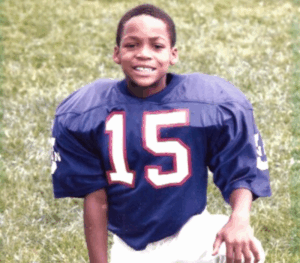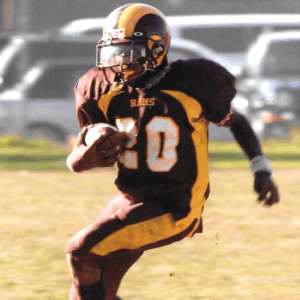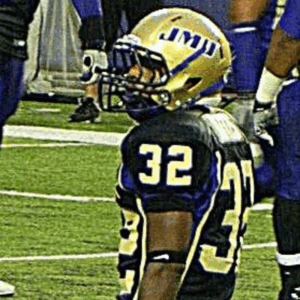Corey Davis was a talented athlete who excelled at football, playing collegiately at James Madison University and Elizabeth City State University. In his 20s, Corey dealt with depression, anxiety, and addiction issues. Corey died by suicide in June 2024, at the age of 32. His family donated his brain to the UNITE Brain Bank, where researchers later diagnosed him with stage 2 (of 4) CTE. Below, Corey’s family share his Legacy Story to shine a light on and support those who are suffering in silence.
Warning: This story contains mentions of suicide that may be triggering to some readers.
Athletic beginnings
Corey Davis was raised in Union, New Jersey, and from a young age, football was his passion. Inspired by the movie Little Giants, he fell in love with the sport at just five years old. What started as a fascination with the game quickly turned into a full-blown obsession. Corey began playing flag football and later joined Pop Warner, where his skills quickly stood out. His heart and determination were evident both on and off the field.

Corey’s high school years were spent at St. Peter’s Prep in Jersey City, NJ, where he played defensive back, running back, and wide receiver. He made an immediate impact as a freshman, breaking the school’s record by scoring 32 touchdowns in a single season. He was known not just for his athleticism but also for his leadership and unwavering commitment to the team. Corey’s talent earned him a scholarship to James Madison University, where he continued his football career at the collegiate level.
It was during Corey’s second year at JMU that those close to him noticed subtle changes in his behavior. We knew he’d suffered a few concussions in high school, and did see signs of aggression and moodiness, but chalked that up to puberty. Now, without family to watch over him, seemingly small issues soon escalated.
Corey found himself involved in several altercations, leading to the loss of his football scholarship. Deeply remorseful, Corey knew he needed a fresh start. He transferred to Elizabeth City State University to pursue his dream of pro football, once again playing defensive back on the field.

Gradual decline
For a time, it seemed like the fresh start was helping Corey. But during a break at home, we again saw signs of trouble — depression, uncontrollable mood swings, and drug addiction which would eventually take over his life. After taking time off from school to get help, Corey never returned to finish his education.
The next decade was spent managing the mental and emotional battles marked by suspected CTE. Corey was anxious, irritable, and confused. He’d get into a deep sleep and not wake up for a long time. Conversely, he wouldn’t sleep for days because of hearing voices in his head.
Corey tried so hard to express his suffering to those closest to him but could never quite put into words what was happening inside. Despite his efforts to push through, the weight of his internal burdens became unbearable.

Corey took his life on June 11, 2024, at the age of 32. The manner of his passing and his behavior right before death reminded us of other football players who died and were later diagnosed with CTE. We immediately contacted the UNITE Brain Bank and donated Corey’s brain for study. It took a little less than a year for researchers to confirm he had stage 2 (of 4) CTE.
Corey’s passing was a devastating loss to us, his friends, and all who knew him. Even in his darkest moments, he never lost the essence of who he was. He was kind, caring, and always sought to make others laugh. His wit, sarcasm, and sense of humor brightened many days. Even through his problems, we knew Corey’s heart was always in the right place.
While his struggles were immense, Corey’s Legacy Story is one of resilience, passion, and a deep love for those around him. His life reminds us of the importance of understanding the effects of repeated brain trauma, and of the need to offer support to those suffering in silence.

For any families reading this story and dealing with a similar experience, we know it can be hard to understand why a loved one is suddenly changing. Still, we urge you to listen to them and support them as much as possible. We’ve also spoken to Corey’s high school football coach, who’s vowed to spread awareness around the impact of concussions to his young players.
Corey is best remembered as a talented athlete, a loving son, grandson, brother, uncle, and friend — someone who, despite his pain, always tried to bring joy to those around him. He will forever be in our hearts, not just for the challenges he faced, but for the soul he shared with the world.
________________________________________
Suicide is preventable and help is available. If you are concerned that someone in your life may be suicidal, the five #BeThe1To steps are simple actions anyone can take to help someone in crisis. If you are struggling to cope and would like some emotional support, call the 988 Suicide & Crisis Lifeline at 988 to connect with a trained counselor. It’s free, confidential, and available to everyone in the United States. You do not have to be suicidal to call.
Are you or someone you know struggling with lingering concussion symptoms? We support patients and families through the CLF HelpLine, providing personalized help to those struggling with the outcomes of brain injury. Submit your request today and a dedicated member of the Concussion Legacy Foundation team will be happy to assist you.

